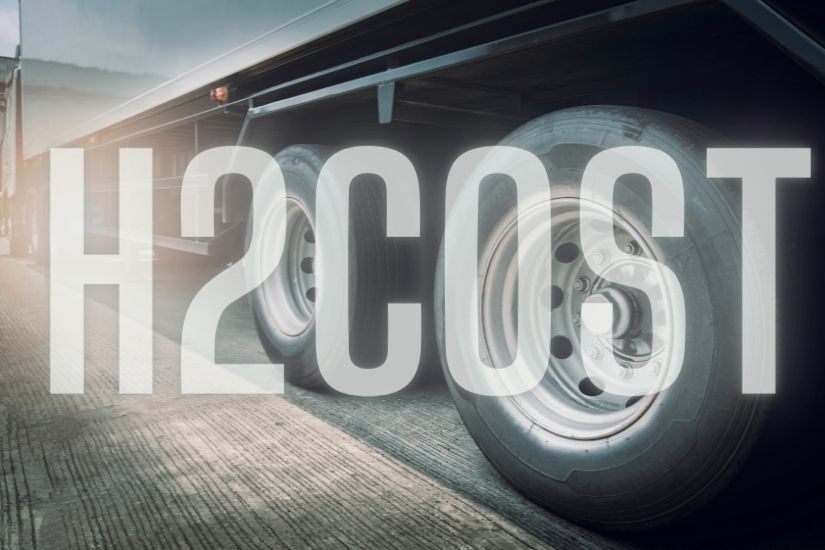
Hydrogen cost parity with diesel cut by up to eight years with new Loop Energy fuel cell
September 18, 2022Loop Energy™ (TSX: LPEN), a designer and manufacturer of hydrogen fuel cells for commercial mobility, will unveil its landmark 120 kW fuel cell system at IAA Transportation 2022 in Hannover, Germany, today.
The announcement marks a milestone for Loop Energy as it believes this new product is a significant achievement in advancing the global hydrogen industry and the transition of commercial transport industries by achieving fuel cost parity with diesel by up to eight years earlier than previously possible*.
The 120 kW fuel cell system, the S1200, builds on Loop Energy’s existing technology, to provide an additional efficiency gain of 20% when it generates electricity.
The S1200 is designed to deliver up to 60% in net system efficiency (1). This efficiency enables an electric vehicle powered by a Loop Energy fuel cell to deliver up to 54% (2) fuel to wheel efficiency compared to the typical fuel to wheel efficiency delivered by a diesel engine powered vehicle of 20% to 25%(3).
Loop Energy believes the S1200 and its next-generation technology will significantly benefit commercial vehicle manufacturers, fleet operators and associated industries, as well as the global clean energy transition as governments seek to reach net zero emissions by 2050.
Loop Energy has achieved this efficiency gain because of its patented eFlow™ fuel cell architecture. Specifically, Loop Energy uses a signature trapezoid plate with narrowing channels for its bipolar plates, which increases gas velocity down the plate to deliver superior performance for fuel efficiency, and power output.
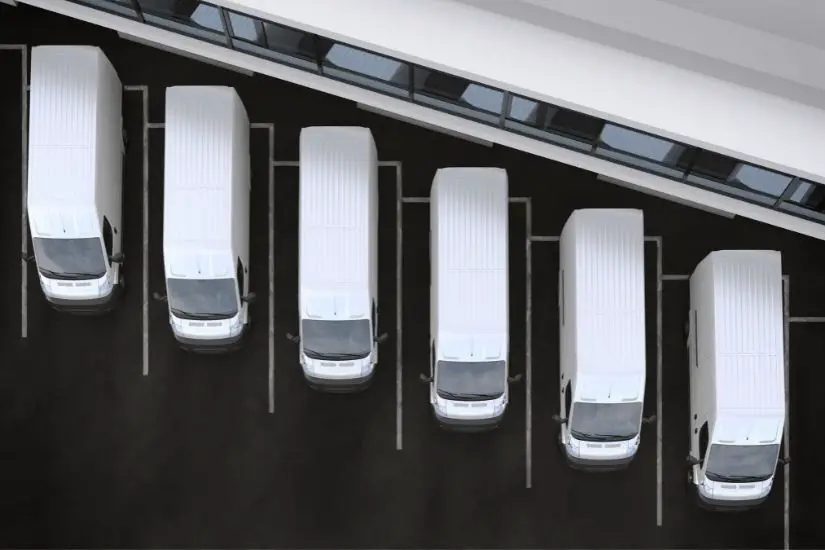
For fleet managers, operators of commercial vehicles and the wider hydrogen infrastructure market, that means less hydrogen fuel used per kilometre, lowering the total cost of ownership (TCO) of hydrogen-electric commercial vehicles.
Fuel costs make up roughly half of the total cost of ownership for heavy-duty hydrogen vehicles, which makes advancement in fuel efficiency a significant factor in creating a tipping point for commercial transition from diesel to clean fuels.
Loop Energy’s presence at IAA Transportation 2022 also signifies its commitment to the European continent, where it plans to expand its presence and customer base. Loop Energy already has offices in Italy and the UK, and is actively engaged with OEMs across the region. Loop Energy is also active in Asia, with its new manufacturing facility in Shanghai.
The S1200 opens up a new market for Loop Energy as the product is specifically designed for medium- to heavy-duty commercial vehicles, which is a step up in power range and scope compared to its other fuel cell products.
The S1200 is delivered as a complete fuel cell system which simplifies and quickens integration for vehicle OEMs, and makes it a ready-to adopt solution for heavy-duty transportation and power system applications.
Loop Energy President & CEO, Ben Nyland said: “With the launch of our new fuel cell system, we are proud to be leading the way in making transport electrification economically viable. The S1200 brings world-leading fuel efficiency levels for medium to heavy-duty vehicles, crucially making the total cost of ownership lower and bringing fuel cost parity forward by four-to-eight years.”
“We are keen to work with OEMs, governments and the wider hydrogen industry to help meet zero-emission targets. We strongly believe that energy transition must happen now, and hydrogen fuel cell technology is in prime place as an alternative to diesel-powered vehicles.”
Canadian Minister of Environment and Climate Change, The Honourable Steven Guilbeault, said: “Very happy to see Canadian companies such as Loop Energy leading in the global clean energy sector. They are creating sustainable jobs for workers, while contributing to our global climate objectives and a better future for everyone.”
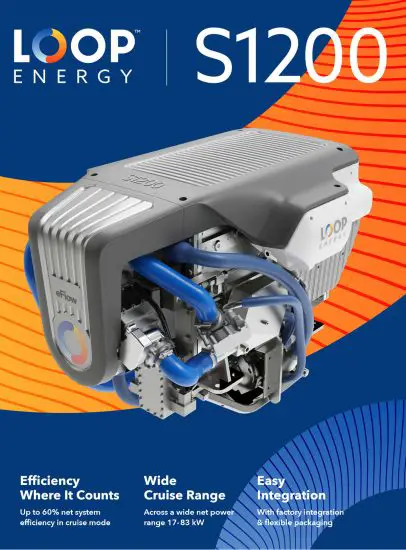
How the Loop Energy S1200 fuel cell beats diesel engines on fuel costs
As an example, fuel consumption for an average loaded truck on long haul with a diesel engine is approximately 48 litres per 100 km (4). With diesel priced between $1.83 to $2.28 / L in Europe, the diesel fuel cost per 100 km for the truck is between $88 and $109 (5).
Assuming a typical diesel engine efficiency at 44%, we can calculate the total energy the diesel engine produces to drive 100 km: diesel contains 10.03 kWh per litre, so the truck requires 212 kWh of energy over 100 km. Knowing we require 212 kWh of energy to drive the same distance using a hydrogen-electric truck, and that hydrogen contains 33.33 kWh per kg, we can determine the hydrogen fuel cost for comparison.
Today, retail delivered hydrogen can be as low as $10 per kg, which corresponds to $90 in fuel cost over 100 km for the fully-loaded truck with 15% regenerative braking, if fitted with a Loop Energy fuel cell with 60% efficiency. Here, the hydrogen fuel cost is already matching diesel fuel.
However, if the truck was fitted with a typical fuel cell with 45% (6) efficiency, the truck’s hydrogen fuel would cost $120 for 100 km, which is not in range of diesel fuel costs. In this situation, hydrogen must decrease to $7.50/kg, or another 25% cheaper, in order to reach parity with diesel fuel cost. Yet, another $2.50 reduction in cost of hydrogen is not expected until 2030, according to a report by Deloitte (7). So, Loop Energy has effectively brought hydrogen-diesel fuel cost parity forward by four to eight years, and its newest product’s fuel efficiency enables hydrogen to be competitive with diesel fuel cost now. (8)
Specifications of the S1200 fuel cell system:
- Up to 120 kW peak power using Loop Energy’s next generation bipolar plates
- Deliver up to 60% for net system efficiency in cruise mode
- Wide cruise mode window that ensures high fuel efficiency across a wide range of power demands for different routes and driving conditions
- Competitive dimensions and flexible packaging with IP67 protection
- Loop Energy’s first load-following fuel cell with dynamic response time
- Wide operating temperature range with freeze-start capability
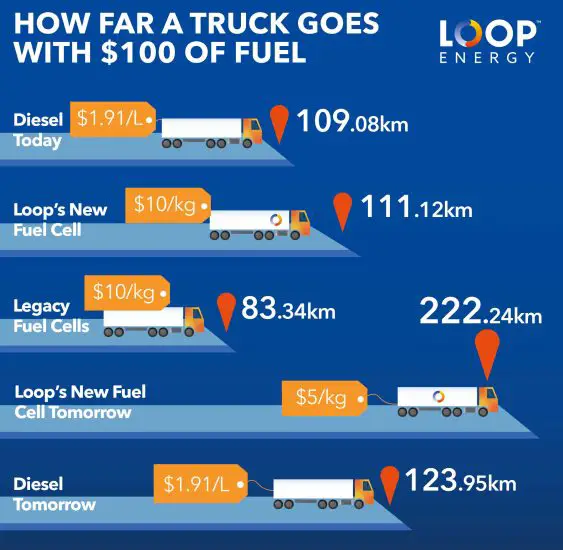


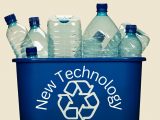
 With over 15 years of reporting hydrogen news, we are your premier source for the latest updates and insights in hydrogen and renewable energy.
With over 15 years of reporting hydrogen news, we are your premier source for the latest updates and insights in hydrogen and renewable energy.